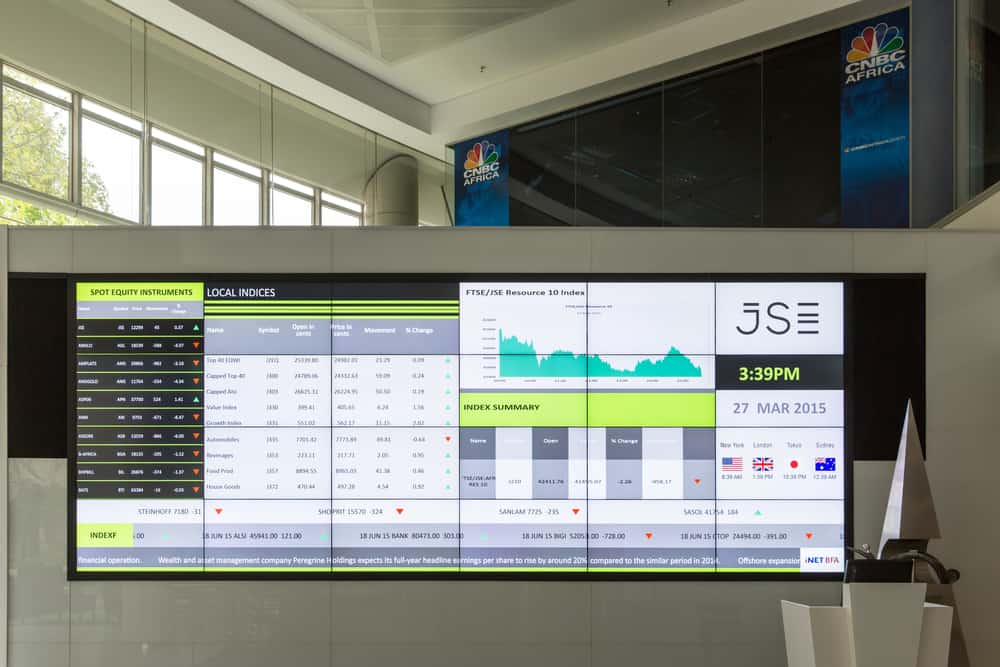
Overview of the JSE and its Operations
Buying shares of stock on a stock market allows anybody to become a “part owner,” or “shareholder,” in a company. The list includes several well-known brands (like Sasol, Naspers, SABMiller, etc).
Companies that are publicly traded have access to a ready source of funding. The JSE's primary function is to facilitate trading in shares, and its secondary function is to promote the safety and security of listed firms and JSE users.

Best Time to Trade on the JSE
The Johannesburg Stock Exchange (JSE) is open Monday through Friday, from 9 am to 5 pm, South African Standard Time (GMT +02:00).
The New York, NASDAQ, and Toronto stock markets have the same opening and closing times, they open at 9h30 am and close at 4 pm Eastern Standard Time (EST), respectively. When translated to Pretoria time, the daylight hours are from 4h30 am until 11 pm.
The London Stock Exchange is open from 8 am to 12 pm, with a lunch break in-between, and then from 12h02 pm until 4h30 pm. In South African time, this is 9 am until 1 pm, and 1h02 until 5h30 pm considering that South Africa is an hour ahead of London.
In contrast to the foreign exchange market, the stock market has a physical presence in the form of exchange headquarters with staff and trading that occurs during business hours.
Therefore, the busiest trading hours are those of worldwide and South African stock markets.
Even if trading systems provide access to different financial markets 24 hours a day, seven days a week, the markets will remain dormant when trading sessions end, except for cryptocurrencies as their markets are open 24/7 every day of the year.
The optimal time to purchase stocks on the JSE in South Africa is thus between 4h30 pm and 11 pm Pretoria time, when NYSE, NASDAQ, and TSX sessions coincide as there is increased liquidity overall in the market.
Moreover, if significant news emerges after the session has ended for the day, anticipate the stock price to respond immediately at the beginning of the following session. Therefore, join the trade immediately at the start of the session, or monitor the market until it calms.
When comparing the operation hours of the major stock exchanges, such as the NYSE, NASDAQ, TSX, and London Stock Exchange, to those of the JSE, the following is observed.
The first morning session according to Pretoria time is the JSE session (9 am to 5 pm), followed by the London session (10 am to 6h30 pm South African time). Finally, the NYSE, NASDAQ, and TSX open at 4h30 pm and close at 11 pm Pretoria time.
Thus, markets are interdependent, and they overlap, which increases liquidity and transaction volume. The first overlap occurs between 10 am and 3 pm Pretoria time when the JSE and London trading hours coincide.
The second overlap occurs between 4h30 and 6h30 pm Pretoria time, when the London and NYSE, NASDAQ, and TSX trading hours coincide.
There is a short overlap between the trading sessions of the JSE and NYSE/NASDAQ/TSX. The JSE stock market closes at 5 pm local time, while the NYSE, NASDAQ, and TSX markets open at 4h30 pm, which means this overlap only lasts 30 minutes.
How to choose the Right Share Broker in South Africa

South African traders could not have picked a more favourable time to enter the investment market than the present. Competition among online brokers is high, which means costs are dropping down and features are being boosted.
Those interested in trading global financial instruments could choose from a wide variety of online forex and CFD brokers. However, there are several factors to consider when choosing a broker and we will go through them here.
Commission Charges
Individual stocks, options, mutual funds, exchange-traded funds, and bonds are the main investment types offered by brokers. Some will also provide exposure to the forex market, futures trading, and cryptocurrency exchanges.
Both the suitability of the broker's offerings to your investment requirements and the fees you must pay is dependent on the investments the broker has available. You should pay close attention to the commissions that are involved with the investments you like.
Overall Reliability
There is a diverse selection of brokers available. Several have been popular for many years, while others have just recently emerged.
That does not imply they cannot be trusted, but if they are managing transactions for clients, they are members of a self-regulatory organization like the Financial Conduct Authority (FCA), the Financial Sector Conduct Authority (FSCA) and other regulators, or subject to additional oversight.
Account Fees
While it could be impossible to eliminate account fees, they may be kept to a minimum. To withdraw funds or investments, or to close your account, most brokers will assess a fee. When switching brokers, your new firm could pay some or all your transfer expenses.
If a broker does not charge them, or if you do not use their optional services, you could avoid paying most additional costs.
Annual costs, inactivity fees, trading platform subscriptions, and additional charges for research or data are all examples of the kind of expenses you should be aware of.
Pricing and Execution on Trades
Cost is less of a factor today, leading to commission-free transactions becoming the norm at most brokerages.
However, you should consider the brokerage's position on the controversial practice of paying for order flow and how much it costs before making a final decision.
This is especially true if you are an active trader who wants their deal completed at the best price possible, even if it means a difference of a few cents.
Additional Tools, Educational Materials, and Features
Look for a brokerage that provides free educational tools like live webinars, detailed how-to instructions, video tutorials, glossaries, and more if you are just starting in the investment world.
You should also look at the broker's commitment to educating its customers about the inherent hazards of more complex trading tactics like options.

Conclusion
When it comes to stock trading, less is more. Spending two to three hours a day is preferable to investing the entire day for most traders of stocks, stock index futures, and index-based exchange-traded funds (ETFs).
Certain hours provide the best potential for day trading, therefore limiting your trading to these hours will optimize your productivity. Trading all day consumes more time than is required for no extra benefit, and even expert stock traders often incur losses outside of these optimal trading hours.
